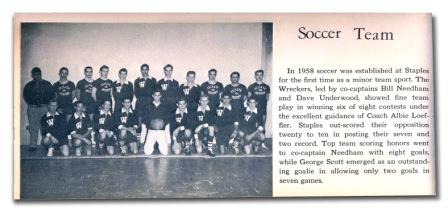Tributes Pour In For Albie Loeffler
Former players, coaching colleagues and veteran referees are praising the life and legacy of Albie Loeffler. The founder of the Staples program died last week, 1 day before his 94th birthday.
The comments have come from around the country. Some are posted on this website; click here to read.
Staples head coach Dan Woog eulogized Mr. Loeffler in his weekly “Woog’s World” column. He wrote:
“That Championship Season” – the Westport Country Playhouse’s current production – is a sad, dark look at the lives of a basketball team 20 years after they and their coach win a state championship.
Albie Loeffler’s teams won state championships too – 6 in soccer at Staples High School, others in soccer and basketball before his arrival in Westport in 1952. But when his athletes reached their 40s, they never looked back on high school as the high point of their lives. As wonderful as winning championships were – and we’re not even talking about Mr. Loeffler’s 13 FCIAC titles, or many other amazing feats, in his 20-plus years as a Staples soccer, basketball, baseball and track coach – they were only way stations on the road to adulthood. Mr. Loeffler’s greatest accomplishment was that he taught boys to become men. And he did it in a way that, today, seems almost to defy description.
If you never knew Mr. Loeffler, you may not understand this. You may not understand the fact that, for Mr. Loeffler, coaching was not complex. It was not about Xs and Os, sports jargon or fancy plays. It was about life – life at its simplest.
You may not understand a concept that seems so straightforward, one that any of his former players can repeat by heart, yet is rarely heard in athletics these days: “You have 3 priorities. Your family comes 1st. School is 2nd. Then comes soccer.”
Those 4 crystal-clear sentences encompass so many other values that Mr. Loeffler also imbued: Commitment. High standards. Honesty. Integrity. Grace. Pride in oneself. Respect for others. Teamwork. Overcoming obstacles. Pursuing excellence. Setting an almost impossible goal, then reaching it. Dealing with disappointment. Being the best human being one can be.
The words seem trite, banal. Yet one of Mr. Loeffler’s gifts was the ability to inculcate such important values without ever resorting to clichés. Somehow he communicated with a few quiet words; sometimes all it took was a stare, or the nearly unnoticed act of bending down, picking up a few tufts of grass and tossing them in the air. When he did that, you knew he was spectacularly, unbelievably, indescribably mad.
When Mr. Loeffler said quietly to a player he had just removed from the field, “We don’t do that on this team,” the youngster got the message. Never again – for the rest of his life – would he blame someone else for his own shortcomings.
When Mr. Loeffler asked an athlete “Will you be joining us on time today?” the player arrived punctually – and, for the rest of his life, was never again late for a practice, game, class or anything else important.
And when Mr. Loeffler informed his new, young team one year, “The men have gone, and the boys have come to play the game,” 2 dozen of them got the message and accepted the challenge. At the end of that season – that state championship season – no one dared ask Mr. Loeffler if they were now “men.” Knowing the answer was reward enough.
If you never knew Mr. Loeffler, you may not understand his unique combination of words, gestures, actions – and silence. You may not realize either that he was one of the wittiest, cleverest men I have ever known.
His steel-trap mind was sharp through 93 years. His curiosity about the way the world works was as boundless as ever, and through 9 decades his mind was more open to new ideas and concepts than those of most men and women half his age.
Perhaps that is part of the reason Mr. Loeffler influenced so many people. Colleagues, even opposing coaches, held him in the same high esteem as his players. Whatever their records, coaching styles or values, they knew he was the coach they aspired to be.
Everyone who knew him had a Mr. Loeffler story. Having played for him, been encouraged and mentored by him, and – for the last 3 decades, been honored to have been his friend – I could write a book. Some day I might.
Many of the stories will be motivational. Others will be funny – though his humor was of the you-had-to-be-there variety. At least 1 story will be life saving.
In 1970 there was 1 sophomore on Staples’ varsity team. One day he gave less than his best effort on the field. Mr. Loeffler pulled him off, and took him aside. “Great players never quit,” he said. Then he turned back to the game.
Decades later, the former player – now a grown man – contracted a degenerative disease. Once he had run and kicked with abandon; now he was in a wheelchair. In his darkest moment, he remembered 4 words: “Great players never quit.” In that instant, his life changed. He is still in a wheelchair, but whenever I see him he has a smile on his face.
Albie Loeffler died on Sunday. He was 1 day shy of his 94th birthday. By my count, that makes 93 championship seasons.
Click “Comments” at the top or bottom of this post to add your own thoughts.

The first Staples soccer team — from the 1958 yearbook



2 Responses to Tributes Pour In For Albie Loeffler